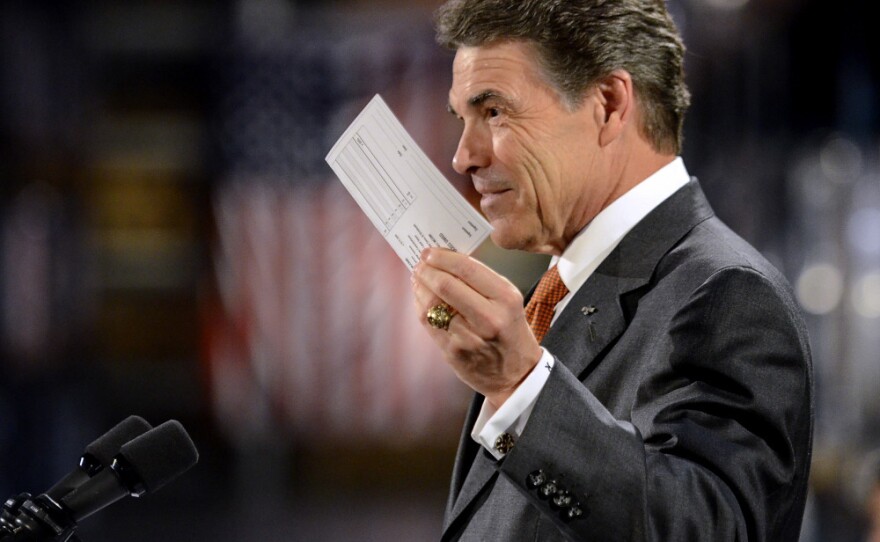Rick Perry doesn't have a catchy marketing slogan for his tax plan. But he's hoping the idea of a flat, 20 percent income tax rate will do for his campaign what "9-9-9" did for Herman Cain's.
"We need a tax code that unleashes growth instead of preventing it; that promotes fairness, not class warfare," Perry said during a speech at the ISO Poly Films factory Tuesday in Gray Court, S.C.
Perry stood next to a pallet piled high with paper, representing the current tax code, then held up a postcard, representing his own plan. Perry says anyone who's afraid of paying more under his plan can opt for the old tax system instead.
"You can continue to pay your taxes, as well as the accountants and the lawyers, under the current tax system that we've got, or you can file your taxes on this postcard," Perry says.
Under Perry's plan, the first $12,500 of income would be tax-free, and popular tax breaks for mortgage interest and charitable contributions would continue. Roberton Williams of the Tax Policy Center says because taxpayers would have a choice of how to file, there's less danger of shifting the tax burden from the wealthy to the poor.
"It might complicate their lives trying to figure out which one is better. But ... nobody is worse off," Williams says. "But it also means revenues will be a lot lower than they otherwise would be."
That means Perry's plan has the potential to blow a Texas-sized hole in the federal budget. He's promised to avoid that through deep cuts in federal spending.
"The flat tax will unleash growth," Perry says. "But growth is not enough. We must put a stop to the entitlement culture that risks the financial sovereignty or solvency of this country for future generations. I mean, the red flags are alarming."
In the past, Perry has described Social Security as a "Ponzi scheme." On Tuesday, he promised to protect benefits for people who are already retired or close to it. But for future retirees, he wants to raise the eligibility age of both Social Security and Medicare. He spoke favorably about replacing Medicare's guaranteed health benefits with a government subsidy seniors could use to buy private insurance. And he favors giving younger workers the option of putting some of their Social Security payments into private accounts — an idea that would worsen the system's finances in the short run.
"Liberals think the American people can't be trusted to safeguard even a portion of their retirement dollars," Perry says. "I happen to think it is time to end the nanny state and empower our people to exercise greater control over their money."
In addition to cuts in Medicare and Social Security, Perry called for sharp reductions in federal spending on education, energy and the EPA. He supports a balanced-budget amendment, but suggested the Pentagon might be spared the budget ax.
Like many of the other Republicans in the presidential race, he wants to roll back health care and financial regulations, and review all new government rules put in place in the past three years.
"The federal nanny state's heavy-handed regulations are keeping our economy in the ditch," Perry says. "It is time to review and scrap regulations that are harming jobs and killing growth."
Perry suggests his Republican rivals are merely nibbling around the edges, while his proposal represents dramatic change. Perry's plan would cap federal spending at just 18 percent of the U.S. economy. It hasn't been that low since 1966.
Copyright 2022 NPR. To see more, visit https://www.npr.org. 9(MDAzMjM2NDYzMDEyMzc1Njk5NjAxNzY3OQ001))







